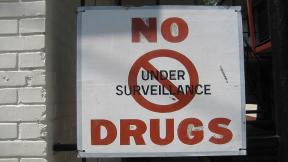
How Can I Tell If a Friend or a Loved One Has a Problem With Alcohol, Marijuana, or Other Illicit Drugs?
Sometimes it is tough to tell. Most people won't walk up to someone they're close to and ask for help. In fact, they will probably do everything possible to deny or hide the problem. But, there are certain warning signs that may indicate that a family member or friend is using drugs and drinking alcohol.
If your friend or loved one has one or more of the following signs, he or she may have a problem with drugs or alcohol:
- getting high on drugs. drinking, getting drunk on a regular basis
- lying about things, or the drugs or alcohol they are using
- avoiding you and others in order to get high, drinking or drunk
- giving up activities they used to do such as sports, homework, or hanging out with friends who don't use drugs or drink
- having to use more marijuana or other illicit drugs to get the same effects
- constantly talking about using drugs or drinking
- believing that in order to have fun they need to drink or use marijuana or other drugs
- pressuring others to use drugs or drink
- getting into trouble with the law
- taking risks, including sexual risks and driving under the influence of alcohol and/or drugs
- feeling run-down, hopeless, depressed, or even suicidal
- suspension from school for an alcohol- or drug-related incident
- missing work or poor work performance because of drinking or drug use
Many of the signs, such as sudden changes in mood, difficulty in getting along with others, poor job or school performance, irritability, and depression, might be explained by other causes.
Unless you observe drug use or drinking, it can be hard to determine the cause of these problems. Your first step is to contact a qualified Muslim counselor, Imam or alcohol and drug professional in your area who can give you further advice.
How Can I Tell if I Have a Problem with Drugs or Alcohol?
Drug and alcohol problems can affect every one of us regardless of age, sex, race, marital status, place of residence, income level, or lifestyle.
You may have a problem with drugs or alcohol, if:
- You can't predict whether or not you will use drugs or get drunk.
- You believe that in order to have fun you need to drink and/or use drugs.
- You turn to alcohol and/or drugs after a confrontation or argument, or to relieve uncomfortable feelings.
- You drink more or use more drugs to get the same effect that you got with smaller amounts.
- You drink and/or use drugs alone.
- You remember how last night began, but not how it ended, so you're worried you may have a problem.
- You have trouble at work or in school because of your drinking or drug use.
- You make promises to yourself or others that you'll stop getting drunk or using drugs.
- You feel alone, scared, miserable, and depressed.
If you have experienced any of the above problems, take heart, help is available.
How Can I Get Help?
You can get help for yourself or for a friend or loved one from a Muslim counselor, Imam, friend or family member. For additional help, you can check out national, State, and local organizations, treatment centers, referral centers, and hotlines throughout the country.
There are various kinds of treatment services and centers. For example, some may involve outpatient counseling, while others may be 3- to 5-week-long inpatient programs.
While you or your friend or loved one may be hesitant to seek help, know that treatment programs offer organized and structured services with individual, group, and family therapy for people with alcohol and drug abuse problems.
Research shows that when appropriate treatment is given, and when clients follow their prescribed program, treatment can work. By reducing alcohol and/or drug abuse, treatment reduces costs to society in terms of medical care, law enforcement, and crime. More importantly, treatment can help keep you and your loved ones together.
Remember, some people may go through treatment a number of times before they are in full recovery. Do not give up hope
HERE ARE THE STRAIGHT FACTS...
About Marijuana
Marijuana is the most widely used illicit drug in the United States and tends to be the first illegal drug teens use.
The physical effects of marijuana use, particularly on developing adolescents, can be acute.
Short-term effects of using marijuana:
- sleepiness
- difficulty keeping track of time, impaired or reduced short-term memory
- reduced ability to perform tasks requiring concentration and coordination, such as driving a car
- increased heart rate
- potential cardiac dangers for those with preexisting heart disease
- bloodshot eyes
- dry mouth and throat
- decreased social inhibitions
- paranoia, hallucinations
Long-term effects of using marijuana:
- enhanced cancer risk
- decrease in testosterone levels for men; also lower sperm counts and difficulty having children
- increase in testosterone levels for women; also increased risk of infertility
- diminished or extinguished sexual pleasure
- psychological dependence requiring more of the drug to get the same effect
Marijuana blocks the messages going to your brain and alters your perceptions and emotions, vision, hearing, and coordination.
A recent study of 1,023 trauma patients admitted to a shock trauma unit found that one-third had marijuana in their blood.
HERE ARE THE STRAIGHT FACTS...
About Cigarette Smoking
Although many people smoke because they believe cigarettes calm their nerves, smoking releases epinephrine, a hormone which creates physiological stress in the smoker, rather than relaxation.
The use of tobacco is addictive. Most users develop tolerance for nicotine and need greater amounts to produce a desired effect.
Smokers become physically and psychologically dependent and will suffer withdrawal symptoms including: changes in body temperature, heart rate, digestion, muscle tone, and appetite.
Psychological symptoms include: irritability, anxiety, sleep disturbances, nervousness, headaches, fatigue, nausea, and cravings for tobacco that can last days, weeks, months, years, or an entire lifetime.
Risks associated with smoking cigarettes:
- diminished or extinguished sense of smell and taste
- frequent colds
- smoker's cough
- gastric ulcers
- chronic bronchitis
- increase in heart rate and blood pressure
- premature and more abundant face wrinkles
- emphysema
- heart disease
- stroke
- cancer of the mouth, larynx, pharynx, esophagus, lungs, pancreas, cervix, uterus, and bladder
Cigarette smoking is perhaps the most devastating preventable cause of disease and premature death.
Smoking is particularly dangerous for teens because their bodies are still developing and changing and the 4,000 chemicals (including 200 known poisons) in cigarette smoke can adversely affect this process.
Cigarettes are highly addictive. One-third of young people who are just "experimenting" end up being addicted by the time they are 20.
HERE ARE THE STRAIGHT FACTS...
About Alcohol
Alcohol abuse is a pattern of drinking that results in health consequences, social, problems, or both.
However, alcohol dependence, or alcoholism, refers to a disease that is characterized by abnormal alcohol-seeking behavior that leads to impaired control over drinking.
Short-term effects of alcohol use include:
- distorted vision, hearing, and coordination
- altered perceptions and emotions
- impaired judgment
- bad breath; hangovers
Long-term effects of heavy alcohol use include:
- loss of appetite
- vitamin deficiencies
- stomach ailments
- skin problems
- sexual impotence
- liver damage
- heart and central nervous system damage
- memory loss
How Do I Know If I, or Someone Close, Has a Drinking Problem?
Here are some quick clues:
-
Inability to control drinking--it seems that regardless of what you decide beforehand, you frequently wind up drunk
-
Using alcohol to escape problems
-
A change in personality--turning from Dr. Jekyl to Mr. Hyde
-
A high tolerance level-being able to consume much more alcohol than everyone else
-
Blackouts--sometimes not remembering what happened while drinking
-
Problems at work or in school as a result of drinking
-
Concern shown by family and friends about drinking
If you have a drinking problem, or if you suspect you have a drinking problem, there are many others out there like you, and there is help available. Talk to school a parent or a trusted Muslim counselor, Imam or friend.
HERE ARE THE STRAIGHT FACTS...
About Methamphetamine
Methamphetamine is a stimulant drug chemically related to amphetamine but with stronger effects on the central nervous system. Street names for the drug include "speed," "meth," and "crank."
Methamphetamine is used in pill form, or in powdered form by snorting or injecting. Crystallized methamphetamine known as "ice," "crystal," or "glass," is a smokable and more powerful form of the drug.
The effects of methamphetamine use include:
-
increased heart rate and blood pressure
-
increased wakefulness; insomnia
-
increased physical activity
-
decreased appetite
-
respiratory problems
-
extreme anorexia
-
hyperthermia, convulsions, and cardiovascular problems, which can lead to death
-
euphoria
-
irritability, confusion, tremors
-
anxiety, paranoia, or violent behavior
-
can cause irreversible damage to blood vessels in the brain, producing strokes
Methamphetamine users who inject the drug and share needles are at risk for acquiring HIV/AIDS.
Methamphetamine is an increasingly popular drug at raves (all night dancing parties), and as part of a number of drugs used by college-aged students.
Marijuana and alcohol are commonly listed as additional drugs of abuse among methamphetamine treatment admissions.
Most of the methamphetamine-related deaths (92%) reported in 1994 involved methamphetamine in combination with at least one other drug, most often alcohol (30%), heroin (23%), or cocaine (21%). Researchers continue to study the long-term effects of methamphetamine use.
HERE ARE THE STRAIGHT FACTS...
About Cocaine and Crack Cocaine
Cocaine is a white powder that comes from the leaves of the South American coca plant. Cocaine is either "snorted" through the nasal passages or injected intravenously.
Cocaine belongs to a class of drugs known as stimulants, which tend to give a temporary illusion of limitless power and energy that leave the user feeling depressed, edgy, and craving more.
Crack is a smokable form of cocaine that has been chemically altered.
Cocaine and crack are highly addictive. This addiction can erode physical and mental health and can become so strong that these drugs dominate all aspects of an addict's life.
Physical risks associated with using cocaine and crack:
- increases in blood pressure, heart rate, breathing rate, and body temperature
- heart attacks, strokes, and respiratory failure
- hepatitis or AIDS through shared needles
- brain seizures
- reduction of the body's ability to resist and combat infection
Psychological risks:
- violent, erratic, or paranoid behavior
- hallucinations and "coke bugs"--a sensation of imaginary insects crawling over the skin
- confusion, anxiety and depression, loss of interest in food or sex
- "cocaine psychosis"--losing touch with reality, loss of interest in friends, family, sports, hobbies, and other activities
Some users spend hundred or thousands of dollars on cocaine and crack each week and will do anything to support their habit.
Many turn to drug selling, prostitution, or other crimes.
Cocaine and crack use has been a contributing factor in a number of drownings, car crashes, falls, burns, and suicides.
Cocaine and crack addicts often become unable to function sexually.
Even first time users may experience seizures or heart attacks, which can be fatal.
HERE ARE THE STRAIGHT FACTS...
About Hallucinogens
Hallucinogenic drugs are substances that distort the perception of objective reality.
The most well-known hallucinogens include phencyclidine, otherwise known as PCP, angel dust, or loveboat; lysergic acid diethylamide, commonly known as LSD or acid; mescaline and peyote; and psilocybin, or "magic" mushrooms.
Under the influence of hallucinogens, the senses of direction, distance, and time become disoriented.
These drugs can produce unpredictable, erratic, and violent behavior in users that sometimes leads to serious injuries and death. The effect of hallucinogens can last for 12 hours.
LSD produces tolerance, so that users who take the drug repeatedly must take higher and higher doses in order to achieve the same state of intoxication.
This is extremely dangerous, given the unpredictability of the drug, and can result in increased risk of convulsions, coma, heart and lung failure, and even death.
Physical risks associated with using hallucinogens:
- increased heart rate and blood pressure
- sleeplessness and tremors
- lack of muscular coordination
- sparse, mangled, and incoherent speech
- decreased awareness of touch and pain that can result in self-inflicted injuries
- convulsions
- coma; heart and lung failure
Psychological risks associated with using hallucinogens:
- a sense of distance and estrangement
- depression, anxiety, and paranoia
- violent behavior
- confusion, suspicion, and loss of control
- flashbacks
- behavior similar to schizophrenic psychosis
- catatonic syndrome whereby the user becomes mute, lethargic, disoriented, and makes meaningless repetitive movements
Everyone reacts differently to hallucinogens--there's no way to predict if you can avoid a "bad trip."
HERE ARE THE STRAIGHT FACTS...
About Inhalants
Inhalants refer to substances that are sniffed or huffed to give the user an immediate head rush or high.
They include a diverse group of chemicals that are found in consumer products such as aerosols and cleaning solvents. Inhalant use can cause a number of physical and emotional problems, and even one-time use can result in death.
Using inhalants even one time can put you at risk for:
- sudden death
- suffocation
- visual hallucinations and severe mood swings
- numbness and tingling of the hands and feet
Prolonged use can result in:
- headache, muscle weakness, abdominal pain
- decrease or loss of sense of smell
- nausea and nosebleeds
- hepatitis
- violent behaviors
- irregular heartbeat
- liver, lung, and kidney impairment
- irreversible brain damage
- nervous system damage
- dangerous chemical imbalances in the body
- involuntary passing of urine and feces
Short-term effects of inhalants include:
- heart palpitations
- breathing difficulty
- dizziness
- headaches
Remember, using inhalants, even one time, can kill you. According to medical experts, death can occur in at least five ways:
- asphyxia--solvent gases can significantly limit available oxygen in the air, causing breathing to stop;
- suffocation--typically seen with inhalant users who use bags;
- choking on vomit;
- careless behaviors in potentially dangerous settings; and
- sudden sniffing death syndrome, presumably from cardiac arrest.
Messages for Teenagers
- Know the law. All of the above-mentioned and many other substances are forbidden by Islam. They are also illegal in the United States. Apart from the fact that you are accountable to Allah for what you do and could very well be punished in this life and the next for using drugs and alcohol, you could also face legal penalties according to United States law: depending on where you are caught, you could face high fines and jail time.
- Be aware of the risks. Drinking or using drugs increases the risk of injury. Car crashes, falls, burns, drowning, and suicide are all linked to drug use.
- Keep your edge. Drug use can ruin your looks, make you depressed, and contribute to slipping grades.
- Play it safe. One incident of drug use could make you do something that you will regret for a lifetime.
- Do the smart thing. Using drugs puts your health, education, family ties, and social life at risk.
- Get with the program. Doing drugs isn't "in".
- Think twice about what you're advertising when you buy and wear T-shirts, hats, pins, or jewelry with a pot leaf, joint, blunt, beer can, or other drug paraphernalia on them. Do you want to promote something that can cause cancer? make you forget things? or make it difficult to drive a car?
- Face your problems. Using drugs won't help you escape your problems, it will only create more.
- Be a real friend. If you know someone with a drug problem, be part of the solution. Urge your friend to get help.
- Remember, you DON'T NEED drugs or alcohol. If you think "everybody's doing it," you're wrong! Over 86% of 12-17 year-olds have never tried marijuana; over 98% have never used cocaine; only about half a percent of them have ever used crack. Doing drugs won't make you happy or popular or help you to learn the skills you need as you grow up. In fact, doing drugs can cause you to fail at all of these things.








Comments
its amazing.well done.its really useful and helping ;)
Location
I like how a lot of these facts were simply rumors and old debunked myths about drugs. If you honestly want kids to be smart about drug usage you are going to need to stop lying to them. I'd like to see scientific research resources backing up all of these claims if they are true.
Location
a fink diz web syt iz totally FAB nd awsome fnxzz a lt it helped me BIG tym
Location
asalamu alaykum
Location
Its really great i really liked it because it can help a lot of people and i thank the one who wrote this. THIS IS SO GREAT.
Location
U R SO RITE. AND GR8
Location
Good info. For Elizabeth, if you have been arrested it is your right to know what you have been charged with for Constitutional reasons and to be fully able to present a defense, should the need arise, you and your representatives should by law know the date to attend court. If either is being/has been with-held it is most probable scare tactics are being used. This is, of course a form of dishonesty.
Location
This is a great article. I was checking it out for school research and found many things that where new to me about drugs. I didn't now all the effect of certain drugs and it amazed me once i did.
Location
that was a great article :)
Location
hey there, yesturday i got put in handcuffs. My friend had left her pills in my room. i had left my peice my friend made me in my room and forgot it was there for i have only used it once.well , my mom called the cops. i do not know when my court date is or what i am being charged with. however i do know that i could go to juvi for all this. and its not like i do drugs or alcohol on a regular basis. i do it when i hang with friends. well i thought she was. she told me that she will not tell them that those were her pills cause she is already in troble for liein to her mom. so she left me with the blame. i never thought this would happen to me. i guess i was wrong. pick your friends carefully. i know i will next time.
Location
Pages
Add new comment